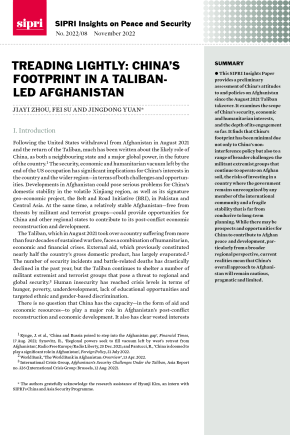Treading Lightly: China’s Footprint in a Taliban-led Afghanistan

This SIPRI Insights Paper provides a preliminary assessment of China’s attitudes to and policies on Afghanistan since the August 2021 Taliban takeover. It examines the scope of China’s security, economic and humanitarian interests, and the depth of its engagement so far. It finds that China’s footprint has been minimal due not only to China’s non-interference policy but also to a range of broader challenges: the militant extremist groups that continue to operate on Afghan soil, the risks of investing in a country where the government remains unrecognized by any member of the international community and a fragile stability that is far from conducive to long-term planning. While there may be prospects and opportunities for China to contribute to Afghan peace and development, particularly from a broader regional perspective, current realities mean that China’s overall approach to Afghanistan will remain cautious, pragmatic and limited.
I. Introduction
II. The China–Afghanistan relationship prior to August 2021
III. China’s interests and footprint under the current Taliban regime
IV. Chinese–Afghan relations: Prospects and challenges
V. Conclusions


